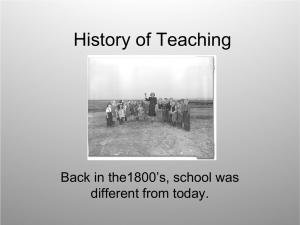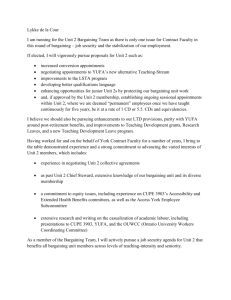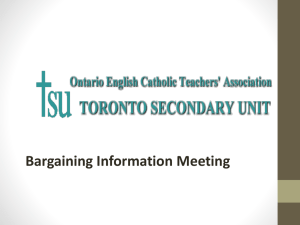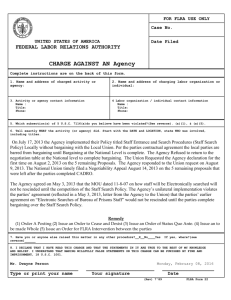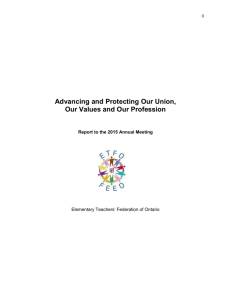Overview of Bill 122 - Simcoe County Elementary Occasional
advertisement
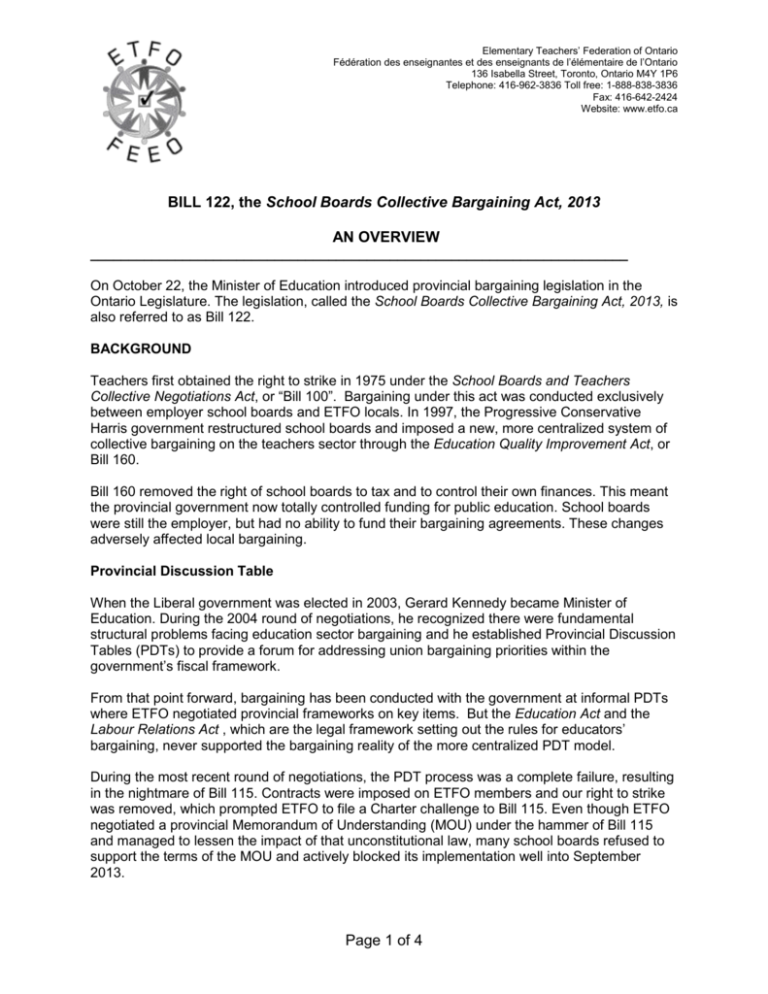
Elementary Teachers’ Federation of Ontario Fédération des enseignantes et des enseignants de l’élémentaire de l’Ontario 136 Isabella Street, Toronto, Ontario M4Y 1P6 Telephone: 416-962-3836 Toll free: 1-888-838-3836 Fax: 416-642-2424 Website: www.etfo.ca BILL 122, the School Boards Collective Bargaining Act, 2013 AN OVERVIEW ______________________________________________________________________ On October 22, the Minister of Education introduced provincial bargaining legislation in the Ontario Legislature. The legislation, called the School Boards Collective Bargaining Act, 2013, is also referred to as Bill 122. BACKGROUND Teachers first obtained the right to strike in 1975 under the School Boards and Teachers Collective Negotiations Act, or “Bill 100”. Bargaining under this act was conducted exclusively between employer school boards and ETFO locals. In 1997, the Progressive Conservative Harris government restructured school boards and imposed a new, more centralized system of collective bargaining on the teachers sector through the Education Quality Improvement Act, or Bill 160. Bill 160 removed the right of school boards to tax and to control their own finances. This meant the provincial government now totally controlled funding for public education. School boards were still the employer, but had no ability to fund their bargaining agreements. These changes adversely affected local bargaining. Provincial Discussion Table When the Liberal government was elected in 2003, Gerard Kennedy became Minister of Education. During the 2004 round of negotiations, he recognized there were fundamental structural problems facing education sector bargaining and he established Provincial Discussion Tables (PDTs) to provide a forum for addressing union bargaining priorities within the government’s fiscal framework. From that point forward, bargaining has been conducted with the government at informal PDTs where ETFO negotiated provincial frameworks on key items. But the Education Act and the Labour Relations Act , which are the legal framework setting out the rules for educators’ bargaining, never supported the bargaining reality of the more centralized PDT model. During the most recent round of negotiations, the PDT process was a complete failure, resulting in the nightmare of Bill 115. Contracts were imposed on ETFO members and our right to strike was removed, which prompted ETFO to file a Charter challenge to Bill 115. Even though ETFO negotiated a provincial Memorandum of Understanding (MOU) under the hammer of Bill 115 and managed to lessen the impact of that unconstitutional law, many school boards refused to support the terms of the MOU and actively blocked its implementation well into September 2013. Page 1 of 4 Following Dalton McGuinty's departure as premier, the government recognized that the bargaining process used in 2004, 2008, and 2012 was unsustainable and announced it would be introducing legislation to address the mismatch between the bargaining reality of PDT discussions and education sector labour statutes. Consultation Regarding a Provincial Bargaining Model ETFO and other education sector unions were invited to five consultations with the government between June and October to discuss principles related to a provincial bargaining model. During the consultations, ETFO advocated for a collective bargaining process that would be transparent, accountable, effective, and meet the needs of the education sector and education workers. Among other things, ETFO wanted to ensure a bargaining procedure that would: preserve the right to strike for both central and local issues; preserve the value and integrity of local negotiations between ETFO and individual school boards; and be free from coercion, penalties, rewards or imposed deadlines. BILL 122 HIGHLIGHTS A two-tier system Bill 122 mandates a system of two-tier bargaining at central and local tables for teacher and occasional teacher bargaining units represented by ETFO. There is also potential central bargaining for DECE, ESP, and PSP locals. Notice to Bargain and Determining Central Table Issues Bill 122 would allow the parties to a collective agreement (i.e., ETFO, school boards) to serve notice to bargain up to 270 days before the expiry of the agreement. Once the notice to bargain has been given, the Minister of Education has a period of 35 days to introduce items to a central table unless there is already an agreement of central issues between ETFO and OPSBA. After 45 days from the notice to bargain, where agreement cannot be reached regarding central table items, either ETFO or OPSBA may take the dispute to the Ontario Labour Relations Board (OLRB) for determination. Central Negotiations Under Bill 122, ETFO is designated as the employee bargaining agency for central negotiations and OPSBA is designated as the employer bargaining agency. The government has a “right to participate” at central tables. The central table is required to negotiate all items falling within the scope of central bargaining. Any item not considered a “central item” is a “local item” for local bargaining. What constitutes a central item will be negotiated by the parties at the table, and the government. However, the Minister can reserve a matter for central bargaining on the basis that: The matter could result in significant impact on the implementation of provincial education policy, in the opinion of the Minister; or The matter could result in a significant impact on expenditures for one or more school boards, in the opinion of the Minister. Page 2 of 4 There is recourse to resolve certain disputes about central items through interest arbitration at the OLRB, but the OLRB is limited in its decision by criteria that includes school boards’ ability to pay and the economic situation in Ontario. The OLRB process is connected to the central table negotiations. Any strike or lock-out sanctions must involve votes of the entire membership of the parties at the table. Five days’ notice is required for strike or lockout. OPSBA cannot proceed with a lockout without the approval of the government. Once ratified, the central table issues will be binding on all school boards represented by the employer bargaining agency. In our case, this means that all English public school boards will be required to implement the terms agreed to by the central table process. Duty To Bargain In Good Faith The parties to central bargaining and the government must meet within 15 days after determining the scope of central bargaining and must bargain in good faith and make every reasonable effort to agree upon central terms. Locally, the school boards and ETFO have the same obligations to bargain in good faith and make every reasonable effort to agree upon local terms. As the designated representative of public school boards, OPSBA is required to “cooperate in good faith” with the government in preparing for and conducting central bargaining, but there is no specified remedy for the failure to do so. OPSBA does appear to have an enforceable duty of fair representation towards school boards it has been designated to represent. Local Bargaining ETFO locals and individual school boards will continue to conduct bargaining on local issues based on the Labour Relations Act. Local notice to bargain must be given and bargaining may begin 15 days after the agreement regarding what issues will be dealt with at the central table. Bill 122 specifically excludes the government from participating in local bargaining. A local agreement does not come into effect until both the central and local agreements have been ratified. Strike And Lockout Bill 122 contains no prohibitions on the right to strike both centrally and locally, and no restrictions as to when strikes can take place. The Labour Relations Act applies to strikes. Role Of Government In Central Negotiations The Bill gives the government a number of new powers over bargaining and control over employer bargaining agents, but without making the government a full party at the central bargaining table. For instance, the government can participate in bargaining without being bound by the Labour Relations Act prohibitions against unfair labour practices. The government can preclude OPSBA from calling a lockout or altering terms and conditions of employment or from making a final offer vote without its consent, but the government also has the right to “approve” an agreed upon collective agreement, and can withhold consent for amendments to central terms of the collective agreement. Page 3 of 4 Terms Of Collective Agreements Bill 122 allows the government to set the terms of operation of the collective agreement by regulation at two years, three years, or four years. ETFO’s CONCERNS ABOUT BILL 122 The government status as a “non-party”; OPSBA’s duty to act in good faith; The provisions governing the government’s obligation to bargain in good faith and adhere to fair labour practices; The scope of ministerial ability to reserve items for the central table; The term of collective agreements; The timelines for serving notice to bargain; The process for grievance arbitration; The restrictions on arbitrators; The threshold to represent support workers at a central table; and The ratification processes. ETFO will continue to analyse this legislation and provide further input to clarify and strengthen collective bargaining rights contained in this proposed legislation through the legislative process. As part of this effort, and in order to speak with one voice about necessary changes, ETFO will be consulting with other education unions to win support for amendments. THE LEGISLATIVE SCHEDULE FOR BILL 122 First Reading – October 22 Second Reading debate - begins October 30 Second Reading vote – occurs when the Second Reading debate concludes If the Bill 122 passes the Second Reading vote, the bill will likely be referred to a legislative committee for review and consideration of amendments. The legislative will committee report the bill, as amended, for Third Reading. Third Reading vote Royal Assent Page 4 of 4
![Labor Management Relations [Opens in New Window]](http://s3.studylib.net/store/data/006750373_1-d299a6861c58d67d0e98709a44e4f857-300x300.png)
